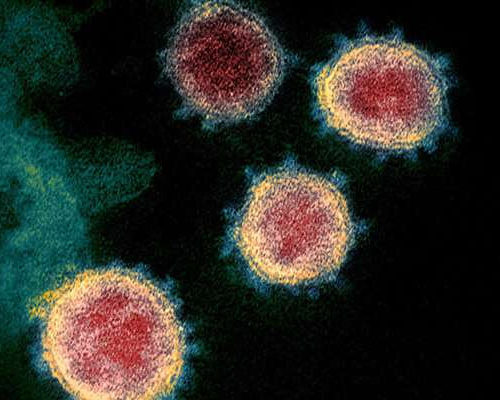By Nick Lavars, October 19, 2020 Cancer cells may have a new enemy in the form of a magnetic bandage Scientists are exploring all kinds of avenues when it comes to tackling cancer, and one interesting possibility involves using magnetic nanoparticles to heat and destroy its cells. Researchers in India have taken an impressive step forward with...
The road to uncovering a novel mechanism for disposing of misfolded proteins
by Baylor College of Medicine Misfolded proteins can grow into a variety of aggregate forms, such as soluble aggregates, soluble polymers and insoluble polymers, which may be disposed of via different mechanisms, including unconventional disposal, extracellular vesicles and autophagy. When the cellular disposal mechanisms fail, such aggregates may lead to disease. About 30 years ago, Dr....
COVID-19: Not all antibodies are equal in fighting the virus
by University of Montreal A colorized scanning electron micrograph of the SARS-CoV-2 virus. When a person is infected by SARS-CoV-2, the number of antibodies able to neutralize the virus rapidly increases. Once the person recovers, their level decreases. In a study last month, researchers led by Université de Montréal professor Andrés Finzi, holder of a Canada Research Chair in Retroviral...
Anti-inflammatory therapy shows promise in slowing progression of multiple sclerosis
by Adrianna MacPherson, University of Alberta Faculty of Medicine & Dentistry U of A researcher Christopher Power and his team found that administering an anti-inflammatory drug called VX-765 through the nose slowed the progression of multiple sclerosis in a preclinical model. Intranasal administration of an anti-inflammatory drug helped reduce disease progression in a preclinical model of...
Targeting the shell of the Ebola virus
UNIVERSITY OF DELAWARE IMAGE: A COILING PROTEIN ‘SHELL,’ CALLED A NUCLEOCAPSID, SHOWN HERE, SURROUNDS EBOLA’S GENETIC MATERIAL, WHICH CONSISTS OF SINGLE-STRAND RNA. As the world grapples with the coronavirus (COVID-19) pandemic, another virus has been raging again in the Democratic Republic of the Congo in recent months: Ebola. Since the first terrifying outbreak in 2013,...
UArizona Health Sciences researchers find biomarker that can appear before stomach cancer
UNIVERSITY OF ARIZONA HEALTH SCIENCES A promising new biomarker that appears in patients before stomach cancer develops may help with early detection of the disease and improve patient response to therapy, according to findings in a study led by University of Arizona Health Sciences researchers. The biomarker can be detected through a simple blood test, saving...
Mechanism linking gum disease to heart disease, other inflammatory conditions discovered
UNIVERSITY OF TORONTO – FACULTY OF DENTISTRY IMAGE: NEUTROPHIL ACTIVATION IS NOW BELIEVED TO BE AT THE ROOT OF OVERACTIVE INFLAMMATORY RESPONSES, AND LINKS CONDITIONS SUCH AS PERIODONTAL DISEASE AND HEART DISEASE. (TORONTO, ON) Oct. 20, 2020 — The link between periodontal (gum) disease and other inflammatory conditions such as heart disease and diabetes has...
New anti-AB vaccine could help halt Alzheimer’s progression
UNIVERSITY OF SOUTH FLORIDA (USF HEALTH) IMAGE: UNIVERSITY OF SOUTH FLORIDA HEALTH NEUROSCIENTIST CHUANHAI CAO, PHD, LED THE PRECLINICAL STUDY TESTING A NOVEL THERAPEUTIC ALZHEIMER’S VACCINE. TAMPA, Fla (Oct. 20, 2020) — Our immune system’s capacity to mount a well-regulated defense against foreign substances, including toxins, weakens with age and makes vaccines less effective in...
Vitamin A boosts fat burning in cold conditions
by Medical University of Vienna Retinol or Vitamin A 3D space model (balls model). A recent study conducted by a research team led by Florian Kiefer from MedUni Vienna’s Division of Endocrinology and Metabolism shows that cold ambient temperatures increase vitamin A levels in humans and mice. This helps convert “bad” white adipose tissue into “good” brown adipose...
Researchers find that patients with acne have reduced expression of the protein GATA6
by Bob Yirka , Medical Xpress An international team of researchers has found that patients with acne have lower levels of expression of the protein GATA6 in their skin. In their paper published in the journal Nature Communications, the group describes their study of skin biopsies taken from acne patients and what they found. Acne is a skin...









